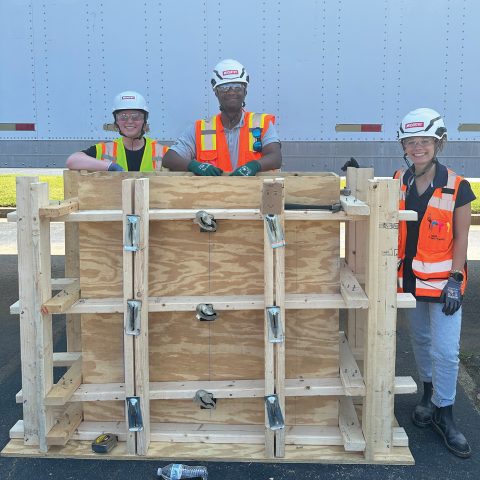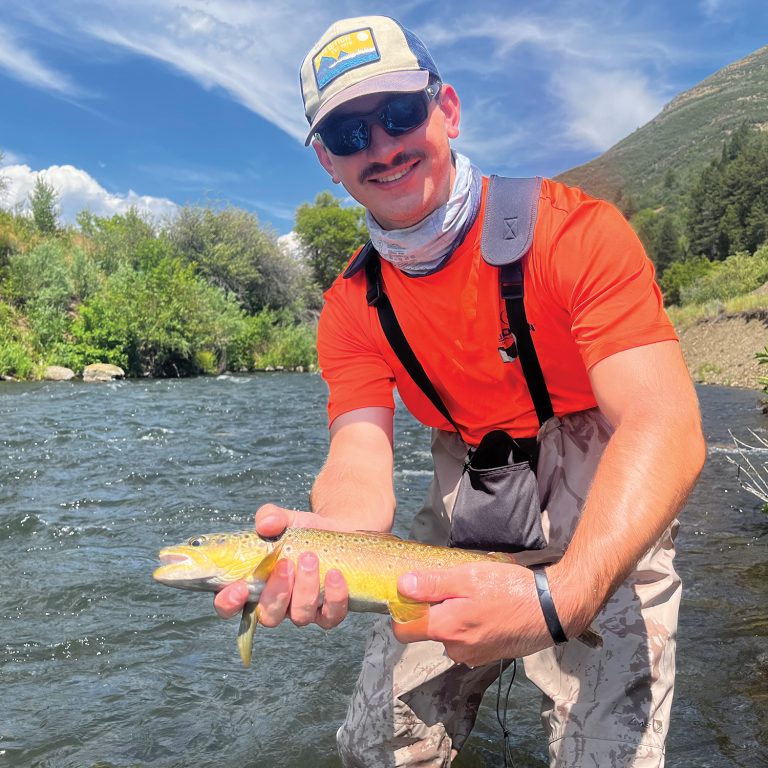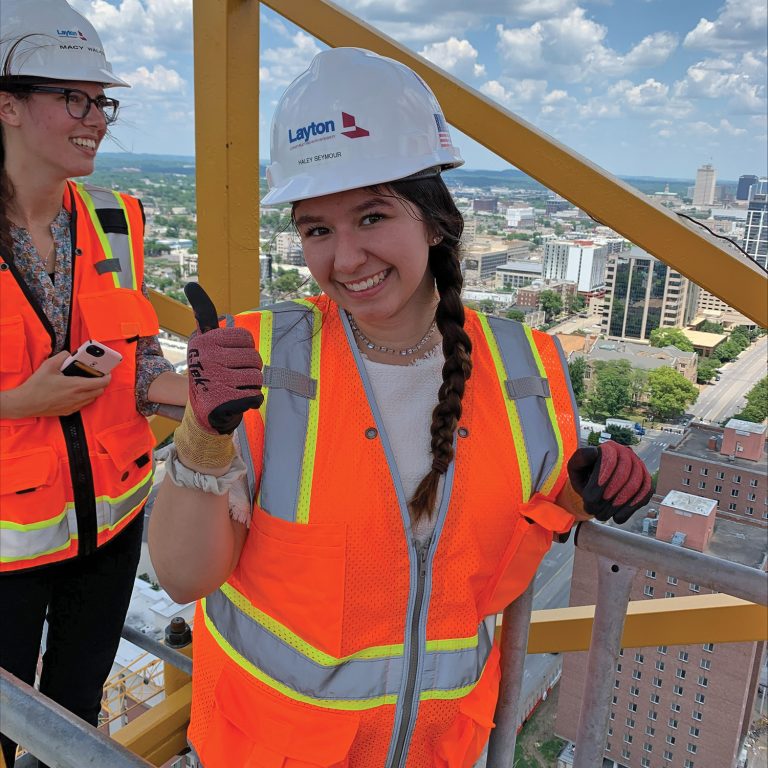BSCI Students Gain Hands-On Experience In Internships
McWhorter School of Building Science (BSCI) students have an impressive 100% placement rate for post-graduation jobs.
Aside from the great education they get at Auburn, why is it so easy for BSCI grads to find work? The answer may lie in the quality and the quantity of internships they complete. Whether they end up back at their same employer after graduation or find a completely new firm, young graduates have said that internships are a valuable part of a building science education.

KAMERON MATHEWS, who is planning to graduate from BSCI in December 2024, has completed two internships so far in his college career. Mathews secured his first summer internship with Morris-Shea Bridge Company, Inc., in Birmingham, Alabama, at the career fair in the spring of 2022, his first semester as a transfer student at Auburn. “It was my first time going, so I followed the advice of my professors who highly recommend speaking with as many companies as possible at the career fairs,” he explained. “Morris-Shea was actually the last company I spoke to that day.” His second internship with McCarthy Building Company in Atlanta in the summer of 2023 came by the way of connections he made in Associate Professor Lauren Redden’s Intro to Construction class, when Shannon Lightfoot, Director of VDC for the Southern Region from McCarthy, came to speak to the class. “I want to work in Building Information Modeling (BIM), which is a specific but not super common department,” he explained. “McCarthy’s BIM team is not only established and robust in their services and capabilities, but they are growing in terms of personnel and what benefit they can provide to the client and project. Their culture and the type of work I’d be doing is what attracted me the most.”
At Morris-Shae, Mathews’ duties including doing initial estimates on documents as they came in, counting and recording quantities that were needed quickly and reviewing spec sheets and drawings for any points of concern. When he was on site, his job was to document how much concrete was used in a day, along with other data like additives and time. “At Morris-Shae, I originally expected to be doing random tasks or punch list items on the jobsite every day,” he stated. “While that did become the case later in my internship, I was actually a part of their Estimating team for a majority for the summer. That was a completely different beast compared to any other job I’ve had, but I learned a lot about preconstruction and what needs to be done well before groundbreaking.”
At McCarthy Building Company, Mathews’ main duty was to produce lift drawings for the concrete teams on site. Using a 3D model of the building, Mathews separated the concrete into individual pours and created construction drawings with plan, detail and isometric views, allowing the foremen on site to have clear and detailed visuals of potentially complex or difficult pours. “At McCarthy, I expected to be in the office the entire summer, and while this was true to an extent it hardly felt like it. We went on multiple trips to active jobsites around Atlanta, always with other interns who I could compare experiences with. Additionally, we went to the vertical expansion of a hospital multiple times, which showed the complexities and risk of working in such an active and delicate environment. Personally, that project revealed me the effect my work had on coordination and efficiency in the field.”
Matthew says both internships gave him the opportunity to use Excel tools to manage data and produce metrics that give insight into how time and materials are being utilized. “For Morris-Shae, I created a tool that allowed users to input the concrete data we were keeping in notebooks and then automatically produced a cumulative daily report. At McCarthy, I worked on a tool to analyze employee timesheet data. I coded the bases for both in Visual Basic and used Power BI for the latter’s graphs and pie charts.” Beyond the technical skills and on-the-job training he gained in these internships, Mathews says he learned how vital communication skills are and how important coordination between employees, internal and external, is to be successful in the industry. “The number one thing I learned is to ask questions! People want to help and teach but if you stay quiet and let the summer ride by, then it will.”

PARKER TURNER interned in Salt Lake City, Utah, for an entire year, and upon graduating last May, he was surprised to find himself back out west, this time as a Project Engineer at GE Johnson Construction Company in Denver, Colorado. Turner said that his initial connection with JE Dunn came at the BSCI Career Fair and eventually led to his current position with GE Johnson. “After a couple dinners and three interviews, I was awarded an internship that took me to northern Utah to work on an industrial factory just 30 minutes south of the Idaho border,” he stated. “I later got in contact with GE Johnson through connections I had made in Utah. They reached out to me via LinkedIn and sent some Auburn graduates to come to campus and meet with me.” As a student in BSCI’s co-op program, Turner was able to take a full semester of classes in the summer that allowed him to do his internship in Utah in the fall then remotely in the spring, pushing RFIs and Submittals while finishing his classes on campus. He then returned to Utah to complete his internship in person again over the summer.
Turner’s original post-graduation plans were to end up somewhere on the east coast, like Nashville, Tennessee, or Charlotte, North Carolina. But when his internship took him out West, he said he fell in love with the mountains and the culture. “I do believe one day I will move back to the South, but I also believe there is no better time to travel and see a different part of the world than when you’re young. When I was first asked to go out west, I was very hesitant to step away from a semester at college and the South, as I have lived here my entire life. However, I learned that I wanted to be somewhere new and that I was ready to consider making a big move across the country for an extended period of time.”
Turner says that some of his responsibilities as an intern included tracking RFIs, managing the submittal log, taking meeting minutes, creating and running punch lists and creating and confirming that all closeout documentation has been completed. He was able to learn about industrial construction and how projects go on through snow and ice. Turner recommends that incoming freshmen actively pursue every opportunity available to them, especially career fairs. “Always try to get out of your comfort zone, as this is where you will grow the most. It’s important to learn to take criticism well, and don’t be afraid to fail as failure on the jobsite is inevitable. You will learn from both your own mistakes and the mistakes of others.”

HALEY SEYMOUR did four separate internships as a student with Layton Construction in Nashville, Tennessee. Originally from the Chicago area, she discovered Auburn’s BSCI program while attending Building Construction Camp while in high school. Career Services Specialist Angie White said she knew Seymour would be successful from the first time she met her. “She’s amazing,” White said. “She was a go-getter from the very beginning, and we could all see that. She’s such a hard worker and has always impressed me with her drive.” Seymour completed a study abroad program last summer that allowed her to graduate a semester early, and she now works as a Project Engineer with Layton.
Seymour attended her first career fair as a college freshman, having been encouraged by faculty members to see what was out there. “I came to Auburn having very little construction background, so I was determined to gain hands on experience as soon as possible,” she stated. “I wanted to make sure this was the career choice for me, and the only way I would know for sure was getting out there!” She was most interested in learning about the healthcare sector of the construction area, and she knew that Layton was very involved in that area. When she began her first internship, her one goal was simply to learn about the industry. “I remember walking to the job site on the first day and finding out I was the only female there,” she said. “That was an intimidating experience at first, but over time I learned to love the intern role and I had gained respect from all of my coworkers.” That first year she learned to read construction documents on site and helped with checking pay applications, flying a drone and revising submittals. She said her next internship, on a healthcare new build job, was quite different from the previous summer’s. “I had two women working as my supervisors and they threw as much work my way as they could! They were the first ones to believe in me fully, assigning me subcontractors to call and schedule deliveries, write up submittals, send out RFIs to the architect, conduct punch lists and gather closeout documents.” In her third internship, she requested to be placed with a superintendent in the field so she could learn more about processes like daily safety checks, coordination between subcontractors, deliveries and installations and doing a final punch list walk-through with owners.
In her fourth and final internship, Seymour was assigned to Layton’s corporate office where she worked closely with the estimating team as well as marketing and business development. She learned the software used to estimate jobs, collected bid packages from subcontractors and even got to hand deliver a completed bid package to an important client. “Having this final experience helped open my eyes to all the possibilities within the construction industry,” she stated. “Now business development is something I have a keen interest in.”
After four years of interning, Seymour accepted a full-time job with Layton’s healthcare division, where she now works on hospital renovations and new builds. While she learned about all sides of the industry during her internships, she says the most important skill she learned was problem solving. “Nothing will go as planned in construction. There is only so much we can control but being able to think fast and bring forth solutions to help save time and money is crucial to the company you work for and the owner you are trying to build lasting relationships with!”
See more in:
Internships,
Student Experience
Related people:
Lauren Redden,
Angie White